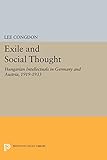Exile and Social Thought : Hungarian Intellectuals in Germany and Austria, 1919-1933 / Lee Congdon.
Material type: TextSeries: Princeton Legacy Library ; 1146Publisher: Princeton, NJ : Princeton University Press, [2014]Copyright date: ©1991Edition: Course BookDescription: 1 online resource (394 p.)Content type:
TextSeries: Princeton Legacy Library ; 1146Publisher: Princeton, NJ : Princeton University Press, [2014]Copyright date: ©1991Edition: Course BookDescription: 1 online resource (394 p.)Content type: - 9780691608396
- 9781400852901
- Exiles -- History -- 20th century -- Germany
- Exiles -- History -- 20th century -- Hungary
- Exiles -- Germany -- History -- 20th century
- Exiles -- Hungary -- History -- 20th century
- Intellectuals -- History -- 20th century -- Austria
- Intellectuals -- History -- 20th century -- Germany
- Intellectuals -- History -- 20th century -- Hungary
- Intellectuals -- Austria -- History -- 20th century
- Intellectuals -- Germany -- History -- 20th century
- Intellectuals -- Hungary -- History -- 20th century
- Sociology -- History -- 20th century -- Austria
- Sociology -- History -- 20th century -- Germany
- Sociology -- History -- 20th century -- Hungary
- Sociology -- Austria -- History -- 20th century
- Sociology -- Germany -- History -- 20th century
- Sociology -- Hungary -- History -- 20th century
- HISTORY / Modern / 20th Century
- 305.5/52/0943 20
- HM213
- online - DeGruyter
- Issued also in print.
| Item type | Current library | Call number | URL | Status | Notes | Barcode | |
|---|---|---|---|---|---|---|---|
 eBook
eBook
|
Biblioteca "Angelicum" Pont. Univ. S.Tommaso d'Aquino Nuvola online | online - DeGruyter (Browse shelf(Opens below)) | Online access | Not for loan (Accesso limitato) | Accesso per gli utenti autorizzati / Access for authorized users | (dgr)9781400852901 |
Frontmatter -- CONTENTS -- LIST OF ILLUSTRATIONS -- PREFACE -- ACKNOWLEDGMENTS -- INTRODUCTION: Hungarian Intellectuals in War and Revolution, 1914-1919 -- PART ONE: THE COMMUNISTS -- ONE Georg Lukács: The Road to Lenin -- TWO. Béla Balázs: The Road to the Party -- PART TWO: THE AVANT-GARDE -- THREE. Lajos Kassák: The Ma Circle -- FOUR. László Moholy-Nagy: The Bauhaus -- PART THREE: THE LIBERALS -- FIVE. Aurel Kolnai: The Path to Rome -- SIX. Karl Mannheim: The Sociology of Knowledge -- CONCLUSION: Community and Consciousness -- NOTES -- BIBLIOGRAPHY -- INDEX
restricted access online access with authorization star
http://purl.org/coar/access_right/c_16ec
Embroiled in the political events surrounding World War I and the failed Hungarian revolutions of 1918-19, a number of intellectuals fled Hungary for Germany and Austria, where they essentially created Weimar culture. Among them were Georg Lukács, whose History and Class Consciousness recast Marxism and challenged even those who repudiated its politics; Bela Balázs, who pioneered film theory and collaborated with film-makers G. W. Pabst, Leni Riefenstahl, and Alexander Korda; László Moholy-Nagy, who codirected the Bauhaus during its heyday in the mid-1920s; and Karl Mannheim, whose Ideology and Utopia was the most widely discussed work of noncommunist social theory during the Weimar years. In this collective portrait combining intellectual history with biographical detail, Lee Congdon describes how Hungarian thinkers, each in a different way, passionately advocated the need for community in a Europe torn by war and revolution. Whether communist, avant-gardist, or Catholic convert, each thinker is examined within the vast tapestry of his works, his cultural and intellectual milieu, and his experience as an exile. Despite the ideological differences of these men, Congdon reveals how their personal destinies and social goals often merged. Since many were assimilated Jews, he argues that their thinking on society was inextricably intertwined with their youthful sensitivity to anti-Semitism in Hungary and with the isolating limitations of their lives in Germany and Austria.Originally published in 1991.The Princeton Legacy Library uses the latest print-on-demand technology to again make available previously out-of-print books from the distinguished backlist of Princeton University Press. These editions preserve the original texts of these important books while presenting them in durable paperback and hardcover editions. The goal of the Princeton Legacy Library is to vastly increase access to the rich scholarly heritage found in the thousands of books published by Princeton University Press since its founding in 1905.
Issued also in print.
Mode of access: Internet via World Wide Web.
In English.
Description based on online resource; title from PDF title page (publisher's Web site, viewed 30. Aug 2021)


